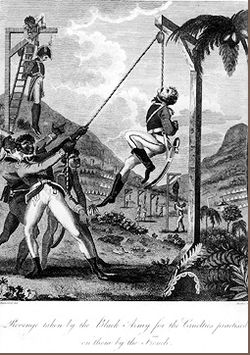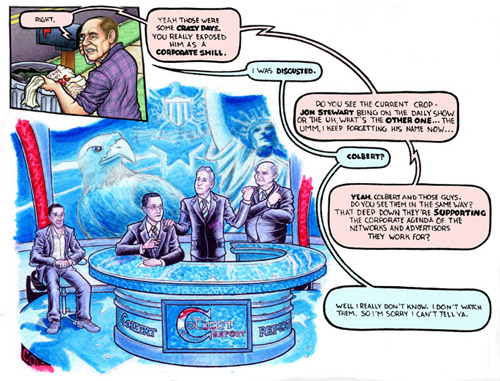
Haitians Hang French Troops For Their Acts of Cruelty
During the earthquake crisis in Haiti I have continued to ask the same question of my friends: How, in the 21st Century, can a country so close to the richest nation on earth be so poor? No one seems to have an answer except for Pat Robertson (who is not a friend, by the way) who suggests that the Haitians made a pact with the devil when they made the French leave. Seems an odd way to refer to a successful uprising against slavery, doesn’t it?
Since the earthquake, I have learned that Haiti was apparently the location of the world’s first successful uprising against slavery. They fought the French and won. It is also the world’s oldest black republic. It is this achievement that a person like televangelist Pat Robertson suggests is a pact with the devil.
But now it seems that U.S. corporations are using Haitian workers in sweatshop factories to manufacture goods at wages of approximately 30 cents per hour. That must be why the tiny nation is too poor to build things that can withstand earthquakes. It will be useful to learn how many of these factories or sweatshops/slave camps have collapsed in the earthquake. I would imagine that there will be some investigation of such places in the near future. Perhaps the slave trade never really ended at all, but simply changed its name to ‘cheap labor’ or ‘sweatshop’ or ‘globalism.’
Here’s a history of Haiti from Wikipedia.
Here’s an article about the U.S. role in keeping Haiti poor.
Disney has used cheap labor in Haiti. They say so themselves right here.
I particularly like their response to a question about child labor:
Q. What is your policy on child labor?
A. Our Code of Conduct for Manufacturers prohibits child labor. Companies that make Disney-branded products must sign a contract stating that they do not and will not use child labor. Child is defined as “a person younger than 15 (or 14 where local law allows) or, if higher, the local legal minimum age for employment or the age for completing compulsory education.” If child labor is discovered in a factory, we generally seek to work with the factory, as well as the licensee that uses the factory, to identify the most feasible solution to remedy the situation as quickly as possible. This may include collaboration with government, multilateral institutions, NGOs or other companies that use the factory.
So Disney will ‘seek to work with the factory’ if it finds child labor going on. Am I the only one who’s shocked that a U.S. corporation would print such a statement of its own accord? Because if it were me finding out about child labor, I would ‘seek to work’ a hammer into someone’s head. For my part, I can only define very cheap labor in a very poor country where workers are threatened with reprisals if they try to improve their lot as slavery. In fact, the more I learn about Haiti the less it looks like a country and more like a camp.

